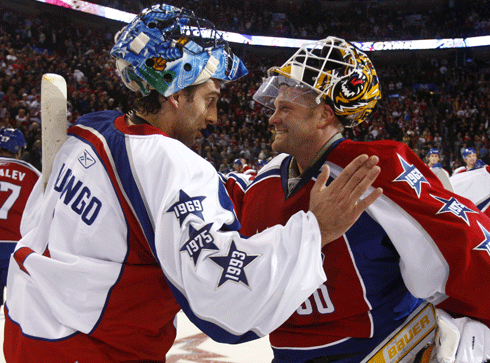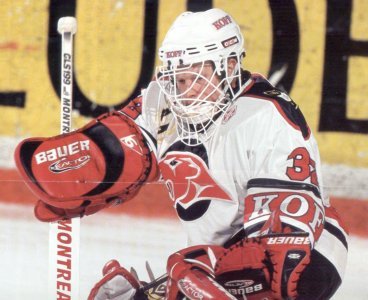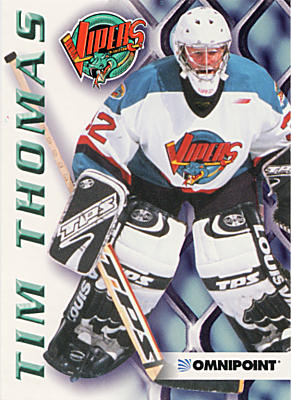
Thomas was born in Davison, Michigan. Luongo in Montreal, Quebec. Davison is a suburb of Flint. Montreal is Montreal.
Luongo was a highly touted goalie as a youth, drafted 2nd overall into Quebec Juniors by the Val-d'Or Foreurs as a 16 year old. He won the Mike Bossey Award which is given to the best pro prospect in the QMJHL. When he was 18, the Islanders drafted him 4th overall amid comparisons to Ken Dryden. Joe Thornton, Patrick Marleau, and Olli Jokinen were the players taken before him. At the time, Luongo was the highest drafted goalie in NHL history.
Thomas, like most American players, played for his school. As a high school freshman, he started off as a forward and defenseman, before eventually replacing the senior goalie who had told his coach "This kid's better than me." Thomas was respected in Michigan high school hockey, partially due to a 62 save, 6OT 3-2 playoff win. But the publicity, attention, and glory was nothing like the aura surrounding Luongo. Thomas was awarded a hockey scholarship at Vermont, becoming the first member of his family to attend college, and earning a chance to avoid working (or trying to work) in the collapsing auto industry in Flint.

Vermont was a mediocre program when Thomas arrived. They finished 7th in the ECAC the year before he got there. Hardly the center of the college hockey universe.
Luongo remained in Juniors, setting records, not being able to come to terms with the Islanders on a contract, winning two QMJHL Championships. He also started for Canada in the 1999 World Junior Championship, going 4-2-1 with a 1.93 GAA, and helping Canada win Gold.
Thomas started as a freshman for the Vermont Catamounts. He was good enough to impress the Quebec Nordiques, who drafted him 217th overall. Thomas improved each season at Vermont and so did the Catamounts. Having a teammate like Martin St. Louis helped. Thomas led the Catamounts to the NCAA tournament as a junior, and took them to their first Frozen Four as a senior. He was All-ECAC twice, and an NCAA East All American twice. After he graduated, he entered the pro ranks.
Luongo started his pro career in Lowell, MA, playing for the Lock Monsters, the Islanders' AHL affiliate. He was almost instantly called up to the Islanders, making his NHL debut as a 20 year old, beating the Bruins in a 2-1 game. He quickly surpassed Felix Potvin as the starting goalie, and the Islanders soon traded Potvin to the Canucks.

Thomas' path to the NHL was much less direct. His first year in the professional ranks started in the ECHL, playing 6 games for the Birmingham Bulls. Then he played 1 game for the Houston Aeros of the now defunct IHL. Then 18 games for HIFK Helsinki of the SM-liiga. So from Vermont to Alabama to Texas to Finland, all in one year.

Thomas helped HIFK win the Finnish Championship (the Kanada-malja trophy), then signed with the Edmonton Oilers in the off-season, once again attempting a traditional route to the NHL by playing for the Hamilton Bulldogs of the AHL. It didn't go too well so Thomas was once again transferred to HIFK.
In the 1999-2000 season, Thomas finally got to play for just one team in a season: the Detroit Vipers of the IHL. His 3.56 GAA and .892 SV% didn't impress. The 26 year old Thomas started the next year in Europe, with AIK, in Stockholm, Sweden. And it was seeming like his career was going to be spent as a journeyman. AIK was his 6th team, in the 5th different league, in the 4th different country, in 4 years since he graduated Vermont.

Islanders' head coach Mike Milbury didn't like Luongo. After his rookie season, the Islanders drafted Rick DiPietro 1st overall, and haven't looked back since. They traded Luongo to the Florida Panthers. Playing half of Florida's games, Luongo set a franchise record with 5 shutouts. His 2.44 GAA and .920 SV% were more than respectable for a 22 year old.

As the Panthers struggled, Luongo improved. He was nominated for a Vezina in 2004, leading the NHL in save percentage and recording 7 shutouts. A year after the lockout, Luongo was a soon-to-be free agent. He'd proven himself as one of the better goalies in the league, winning 35 games in his final year with the subpar Panthers. There were rumors that apart from a significant amount of money (which he deserved) he demanded that the Panthers retain goalie Jamie McLennan as the backup, and hire a new goalie coach.
With his contract looming, the Panthers traded Luongo to Vancouver, in exchange for Todd Bertuzzi, Alex Auld, and Bryan Allen.
The Bruins decided to sign Tim Thomas as a free agent, but also allowed him to remain in Europe. He joined the Finnish team Kärpät. A year later, he found himself in Providence of the AHL. Even though he still had John Grahame, Andrew Raycroft, and Steve Shields ahead of him on the Bruins' depth chart, Thomas made his NHL debut on October 19, 2002. He was 28 years old. 8 years older than when Luongo made his debut.
Luongo was welcomed to Vancouver as a conquering hero. A hockey-mad city finally had a legitimate goalie. The Canucks' own GM had once described the team as a "goalie graveyard." Luongo didn't let them down. In his first season as a Canuck, he tallied 47 wins, a 2.29 GAA, and a .921 SV%. He was nominated for the Vezina and Hart trophies, but lost out to Martin Brodeur and Sidney Crosby, respectively.
Thomas, like most players, spent the lockout playing in Europe. But this was familiar territory for the American goalie. He joined Jokerit in Finland, registering a 1.58 GAA in 54 games with a .946 SV%. He won awards for the best player in the league.

In 2005, it seemed as though Thomas was going to settle down as a European hockey player. He signed a deal with Jokerit, that included an NHL option. He was now a European player with the potential to transfer to North America, not the other way around.
The day before the Finnish season began, the Bruins signed Thomas. He was sent to Providence, but eventually found his way to Boston when Andrew Raycroft and Hannu Toivonen both got hurt. He played 38 games, and after the Bruins traded Raycroft to Toronto, they needed Thomas as a back-up and signed him to a 3 year deal.
While Luongo was having regular season success in Vancouver, the Canucks were struggling to get to that next level. They were consistently surpassing 100 points, yet were annually getting knocked out of the playoffs in the Conference Semis. Luongo was getting most of the blame.
He was great in the '07 playoffs, but allowed a series-ending OT goal when he literally looked at a ref for a penalty instead of watching the puck. In the '09 playoffs, he allowed 7 goals in a series-deciding Game 6 loss to Chicago. The Canucks then signed him to a 12 year, $64 million contract.
Tim Thomas finally became a true NHL goalie when the Bruins signed him to a 3 year deal. Although there always seemed to be someone in his way, preventing him from starting. Hannu Toivonen had the job in 2006, and Thomas wound up starting anyway. In 2007, the B's signed Manny Fernandez, and Thomas was once again relegated to the backup role. Fernandez got hurt, Thomas stepped up, and even made the All-Star Game. In 2008, Thomas was the clear-cut, 1A starter, with Fernandez in a 1B role. Thomas won the Vezina. In 2009, Thomas was again the starter, but he was sluggish on the ice. 22 year old Tuukka Rask won the starting job, along with the affections of countless Boston fans, spawning phrases such as "Tuukka Time."

Luongo replaced Martin Brodeur as Team Canada's goalie in the middle of the 2010 Olympics. He won four straight elimination games, and the Canadians won their first Gold since 2002. But he struggled in the NHL playoffs, posting a 3.22 GAA and .895 SV%. He also stepped down as the Canucks' Captain, yielding the position to Henrik Sedin.
Before the 2010-11 season, the Bruins tried trading Thomas. But teams found his long-term contract to be a bit too hefty to swallow. The Bruins kept Thomas, starting the season with Rask in net. Rask's 1.97 GAA the year before had earned him the spot. And once again, Thomas entered a year as a backup.
But Rask lost 7 of his first 8 starts. Thomas won his first 7 straight. By December, he was the starter, Rask was the back-up. By January, Thomas was an All-Star. By March, he was a Vezina nominee. By June, he was a Conn Smythe contender.
Luongo's career also seemed to be rejuvenated. A new goalie coach in Vancouver produced a more conservative approach from Luongo. He set a career low with a 2.11 GAA, and his 2nd best SV% ever at .928. He struggled in the opening round of the playoffs, but wound up a Game 7 hero against Chicago.
These goalies have now met in the Finals, and after 4 games, one has allowed 5 goals against the best offensive team in the NHL, the other has surrendered 14. That's more goals than Luongo allowed in the previous two series. Tim Thomas has been the Bruins' answer, while nothing but question marks surround Luongo.
When Tim Thomas struggles, he summons an excellent game the next time out. He thrives in adversity. You can see it when he willingly enters the fray in front of the net. But Luongo often finds himself in quicksand. He makes his struggles worse. He presses, he pushes. He tries too hard to win the game on his own. We saw him push too hard in Game 4, abandoning the conservative approach that made him a Vezina nominee. And nobody in Vancouver knows exactly what version of Luongo will play in Game 5, if he plays in Game 5.
And maybe the reason Thomas handles adversity, handles tough losses like Games 1 and 2, is because he's accustomed to the struggle. He's battled and earned every second of ice time he's ever played, from a high school freshman to Finland to Sweden to the Bruins. Luongo, on the other hand, has always been the star. Since he was a 16 year old drafted into the QMJHL, since he was selected by the Islanders, then eventually traded to Vancouver. He started as the top dog at every level of play. He didn't have to climb the mountain, he was born at the top. He's been able to rely on just his talent, and perhaps that's why his character has never fully developed.
Maybe I'm psychoanalyzing too much here, but these two goalies are completely different types of people. And that matters, especially in such a unique position as goaltending, it's not just about strength, speed, vision, or flexibility. The so-called intangibles have a huge impact on how well a goalie performs. And in that category, Tim Thomas is much more qualified. And it's because he's had to build character to get to where he's gotten.
Sources:
Canada.com
ECAC Hockey
MLive.com
-The Commodore









No comments:
Post a Comment